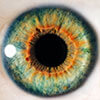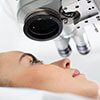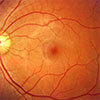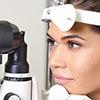Retinitis Pigmentosa
Retinitis Pigmentosa, A Hereditary Condition
Retinitis pigmentosa (RP) describes a group of related genetic disorders that tend to run in families and cause a slow but progressive loss of vision.
RP causes retinal degeneration, loss of function of the light-sensitive neural layer at the back of the eye. RP usually affects both eyes equally with severity, ranging from no visual problems in some families to childhood blindness in others.
RP gets its name from the fact that one of the signs is a clumping of the retinal pigment that can be seen during an eye exam.
Research, Rehab Help Those with RP
The earliest symptom of retinitis pigmentosa, sometimes noticed in childhood, is night blindness or difficulty with night vision.
People with normal vision adjust to the dark quickly, but people with night blindness adjust very slowly or not at all.
A loss of side vision, or tunnel vision, also is common as RP progresses. Unfortunately, the combination of night blindness and the loss of peripheral vision can be severe and lead to legal blindness.
While there is a pattern of inheritance for RP, 40 percent of RP patients have no known previous family history. Learning more about RP in your family can help you and your eye doctor predict how RP will affect you.
No cure; research continues
Considerable research is being done to better define the hereditary cause of RP. As hereditary defects are discovered it may be possible to develop treatments to prevent progression of the disease. While developments are on the horizon, particularly in the area of genetic research, there is currently no cure for retinitis pigmentosa.
Ask about Vitamin A
Nutritional supplements may have an effect on RP. It has been shown that Vitamin A can slow the progression of RP. Large doses of Vitamin A can be harmful to the body. Vitamin E supplements appear to make RP worse. Your eye doctor can advise you about the risks and benefits of Vitamin A and how much you can safely take.
Despite visual impairment, people with RP can maintain active and rewarding lives through the wide variety of rehabilitative services that are available today. Until there is a cure, periodic examinations by your eye doctor will keep you informed of legitimate scientific discoveries as they develop.









